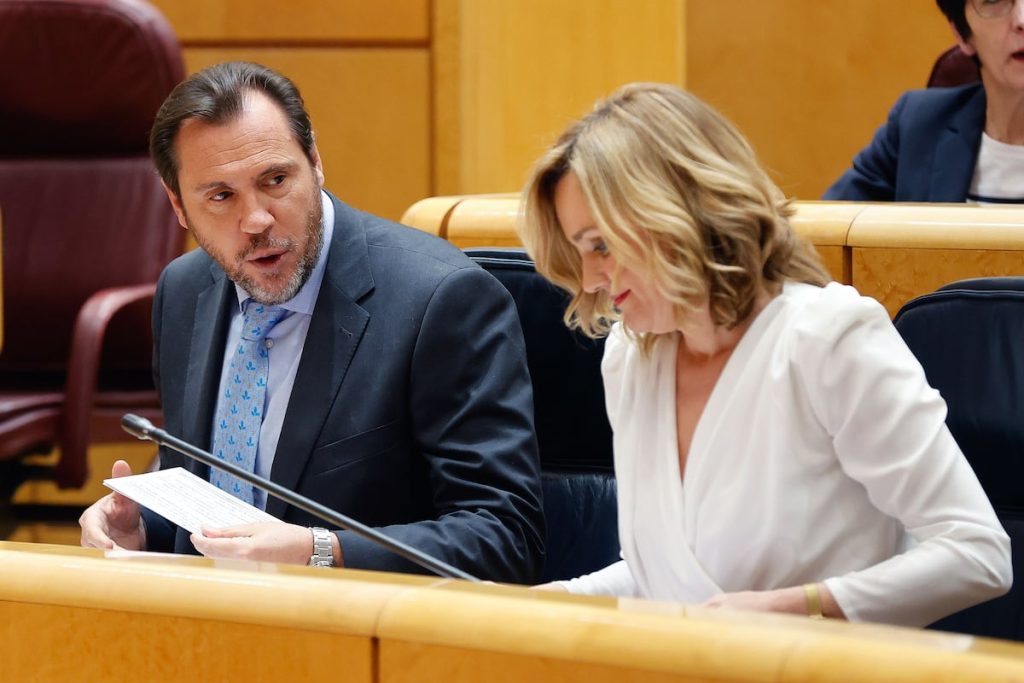Any day is good to continue feeding the contest of hyperboles that is so often represented in the Spanish Courts. On a Tuesday in early May in the Senate, for example, with the warm spring heat enveloping the first government control session after Pedro Sánchez’s five days of political-existential meditation, the PP spokesperson, Alicia García, alleges that the government is sinking Spain into “democratic depravity”- “In what serious country does a president appropriate democracy, the judicial power, and even the free opinion of citizens?” In defense of Sánchez, who was absent from the session, the first vice president, María Jesús Montero, jumped in to deny that the delayed resignation threat had damaged the international image of the socialist leader – “The President of the Government is the best ambassador that Spain has ever had.” And cheers and applause sounded from both sides.
The Congress has been practically paralyzed for two weeks following the old custom of interrupting its main activities during an electoral campaign. But in the Senate, the majority party works tirelessly to preserve the essence of democracy – or that is what Alberto Núñez Feijóo and his supporters defend – and nothing is interrupted even though the parties are in full electoral clash in Catalonia. This Tuesday, it was time for the control session, the first parliamentary clash between the government and the opposition after Sánchez’s introspective retreat, although in his absence.
The PP painted the usual terrifying picture to define the government: “totalitarian drift,” “crusade against rights and freedoms,” “leading us to Venezuela,” “a quagmire of corruption”… All that combined with quips about the letter to the Spaniards in which Sánchez declared himself in love with his wife. “Love farce,” Alicia García called it. “Enamored gallant within a buffoonery opera,” added her colleague Miguel Ángel de la Rosa. The government representatives seemed determined to show their willingness to stop the “mud machine,” a phrase that has become omnipresent in the government’s discourse. Montero and the minister spokesperson, Pilar Alegría, concentrated their rhetorical efforts on reproaching the PP for their attitude, far from the exchanges of heavy accusations that had been heard in the Congress in recent weeks. “Recognize the legitimacy of the ballot boxes,” Montero demanded of the populares. “You are doing terrible harm to democracy.” “Abandon the politics of destruction and lies once and for all,” Alegría insisted.
Even the always talkative Óscar Puente appeared more restrained than usual. But the Minister of Transport could not resist the temptation when Senator Juan José Sanz Vitorio accused him of accepting an invitation to a yacht from a businessman to whom he had awarded contracts when he was mayor of Valladolid. “You have to have nerve to talk about yachts. The last place I would never get on to would be a drug trafficker’s yacht,” the socialist replied. In a very different tone from the rest of the PP speakers, Sanz Vitorio, a longtime acquaintance of Puente in Castilla y León, indulged in irony to recall various controversies surrounding the minister until ending with the latest: his comments on “substances” consumed by Javier Milei that provoked a fierce attack from the Argentine president on the government. “It is essential that he stop being a minister,” Sanz Vitorio concluded what Puente defined as “a performance” to demand his resignation. But the Minister of Transport himself could not help but laugh at one of the senator’s most celebrated ironies – “commission Tezanos [CIS director] a survey to see who is more handsome, Brad Pitt or you. Brad Pitt dies.”
The session offered a perfect mix of the two tones of Spanish politics. When discussing more technical topics – water policy, clean energy, the EBAU, negotiations on Gibraltar, infrastructure in La Rioja… – the discussion, even with critical terms, remained on track, while the hall seemed bored with half-hearted conversations. But when a more political issue arose, the benches returned to chaos and the adjectives fell like projectiles in the Chamber. In this final facet, the PP worked hard to position themselves as defenders of journalists and to interpret Sánchez’s criticisms of “pseudomedia” that spread falsehoods as a plan to end press freedom in Spain. “It is a planned cleaning strategy by the president himself,” clamored former Extremadura president José Antonio Monago, who attributed to the socialist leader the intention of turning the media into a “mere instrument of political propaganda.” From his seat, Monago seemed surprised at Pilar Alegría’s very predictable reply, mentioning the threats from Miguel Ángel Rodríguez, all-powerful chief of staff of Madrid’s president, Isabel Díaz Ayuso, to journalists from EL PAÍS and Eldiario.es for publishing news about his partner’s tax fraud. The PP also put Ceuta senator Cristina Díaz Moreno into play to attack the “obscene interference of the government” in RTVE, which she defined as the “propaganda machine of Sanchezism.” The minister spokesperson expressed her surprise twice that this senator was the one launching such sharp criticisms, but she did not go into more detail. A look at Díaz Moreno’s official resume clarified the mystery: she joined the PP after having directed the public radio and television station in Ceuta.


